Welcome to another issue of The Newport Cornucopia where we dig through the newspapers archives for interesting news articles and adverts. All articles are posted verbatim and most headlines are original (headlines in quotes are my own).

Weighing Machine
To the Editor of the Monmouthshire Merlin.
SIR,—I feel convinced that it is only necessary to hint at an inconvenience to which a great portion of your readers are subjected, in order to gain your ready and kind assistance towards a remedy. Persons engaged in agricultural pursuits in this neighbourhood, and, indeed, in all parts to the west of the Salutation, at Newport, experience great trouble, delay, and expense, from the want of a weighing machine in that quarter. Many persons, for instance, who bring in hay for sale to your fine market, are obliged to drive their teams through the town over the bridge, and to the weighing machine at the end of Clarence Place!!

Surely a machine near the pump, at the Salutation, would not only be a very great accommodation, but would pay well the spirited New Market Company, or, indeed, any of that body that would place it there and with respect to the advantages of traffic to your town, it may be sufficient to remark that many persons, to my knowledge, have made bumping sacrifice of their hay in rick, to avoid the trouble of such a round-about circuit of haulage in order to get the loads weighed.
Please to put this in the MERLIN, to oblige several agricultural friends, and
Yours obediently,
St, Mellons, April 3rd, 1849. T. R.
— Monmouthsire Merlin, Saturday 7th April, 1849
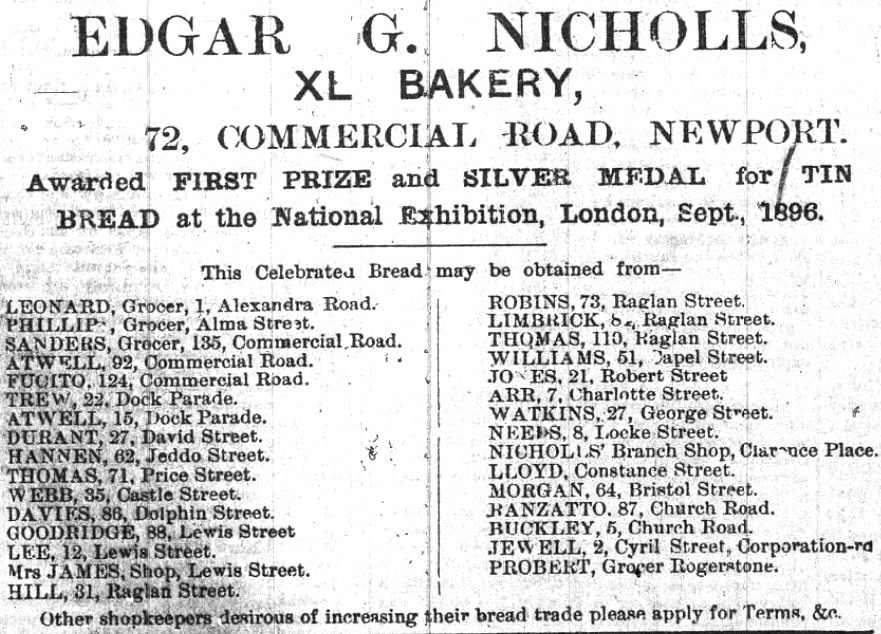
Dangerous and Filthy State of Pavements
A correspondent urgently calls our attention to the fact—one which we have frequently though vainly remonstrated upon—that the whole line of pavement; from one end of the town to the other, is in so very broken, sunk, and vile a condition, that locomotion is not only impeded by the thousand ankle-deep and extensive pools, but is also rendered highly-dangerous from the many loose flags which now and I then either partially throw the passenger down, or his useful members.
A filthy crossing or two is also alluded to, in no very gentle or measured terms, and from those adjacent for example those adjacent to the King William Inn, at the bottom of Commercial-street, and by George-street, on the Pill- road, both of which, saith our justly-incensed correspondent, more closely resemble the sloughs of some dirty village, than the streets in so improved (in many other respects) and rapidly increasing a town in importance and respectability, as Newport. Its state, he says, with regard to these mentioned nuisances, is somewhat worse than it was when he was a boy, and that," he adds, was some thirty years ago." He wishes, with ourselves, the Commissioners would immediately proceed to adopt some measures for the removal of these abominations, with the same alacrity that the rates for such purposes are applied for that the eyes and feet of our townsfolk, more especially of that portion whose gentler natures require every possible attention, kindness, and comfort, may no longer be unnecessarily annoyed.
He concludes by hoping to see some communication from the powers that be," in our next week's MERLIN, giving the best reason they can, for this dereliction of a duty well-paid for, but badly performed."
— Monmouthshire Merlin, Saturday 6th March, 1841

The Zanettos Play The Empire
Billed as the Marvellous Japs and also the Royal Zanettos, the trio of English brothers toured Europe and the US whilst dressed in Japanese makeup and costumes. They were well known for being professional jugglers.

One of the brothers — George Bale — was popular for doing the ‘turnip challenge’ which involved catching a turnip with a fork in his mouth and supposedly caught one when it was thrown off Clifton Suspension Bridge.

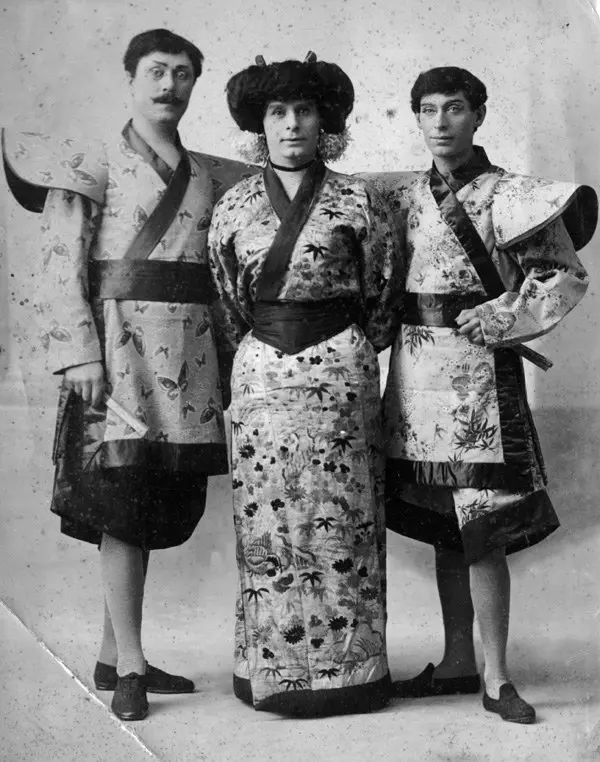

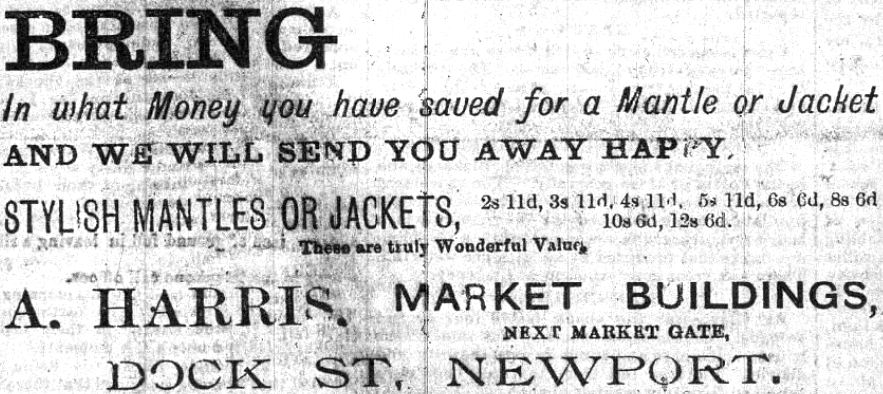
‘Newport — One of the dullest places in the kingdom’
In an article about entertainment, the following was mentioned in a South Wales Argus column on February 1st, 1895.
Newport is one of the dullest places in the kingdom. There is no public evening resort, no promenade and no public band. There are plenty of river wharves, business premises, and so on, but the enjoyment and happiness of the multitude are lost sight of to a great extent in the all engrossing desire for purely commercial prosperity. There is something else worth living for besides shekel gathering and port enterprise, though these are, doubtless, of the greater importance (please excuse me, I had no other word), and it behooves us not to entirely neglect and overlook the gospel of amusement. A Monday afternoon band in the park in the summer, and, during the winter, a Sunday evening concert in the Temperance-hall, would do perhaps, as much good as many of the sermons to which we listen.
— South Wales Argus, Friday 1st February, 1895 (Subscription Required)

Another Mention of the Machine
About two o'clock, a.m., on Friday week, a window was broken in a house adjoining the machine, Cardiff-road, and two boxes, containing almost the entire property and money of a man named Robert Start, who, with his family, had come from Merthyr on the preceding night, with the intention of commencing the business of a butcher in Newport, and had unfortunately left the boxes in the house. The poor man is literally ruined by this heartless plunder.
— Monmouthshire Merlin, Saturday 6th March, 1841
'Jack the Cripple, the perfect specimen of a ruffian with a broken beak'
John Yarward, alias Jack the Cripple, as perfect a specimen of a ruffian as could be comprised in five feet and an inch of height, with a hideous aspect and a broken beak, was placed at the bar, charged with creating a riot in Friars' Fields, on Sunday, the 21st February. The offence was proved, and he was convicted in 10s. and costs. This fellow, who is a noted denizen of the region of Friars' Fields, and who is said to be "up to everything, from pitch and toss, almost to manslaughter," had been in custody for 12 days previously, on a charge of felony, but as the witnesses for the prosecution could not be produced, he was discharged.
— Monmouthshire Merlin, Saturday 13th March, 1841
Drunk on the Highway
George Clarke, who did not appear, was summoned for being drunk on the highway at Coedkernew, on Monday. When found by the officer just before midnight he was lying helplessly drunk in the road. If not found he would probably would have been frozen to death. Fined 5s and costs, or seven days.
— South Wales Argus, Monday 11th February, 1895 (subscription required)
Begging
George Williams was charged with begging in Stow Park, but was discharged on promising to leave the town.
— South Wales Argus, Monday 11th February, 1895 (subscription required)
A Vestal from the Friars
A nymph from the Paphian bowers that now desecrate the once-hallowed sanctuary of the Black Friars, commonly known by the title of Friars' Fields," arrayed in a long plaid shawl, demure brown frock, and cottage bonnet, with an interesting face, and smiling eyes, was brought up, charged with being drunk, and knocking up an awful row," on Stow-hill, last Sunday night.
The prisoner, Mary Cecil stated that she had merely taken a glass or two or three of rum, which a chap had given her; and that while talking with him on Stow-hill, the "chap began to pull her about at which she very properly cried out, and begged him to desist; and then up comes the policeman, and lugs her off to the Clock-house.
The Court asked her if she would promise to behave better, if not now sent to Usk she replied she would; and was then discharged.
— Monmouthshire Merlin, Saturday 7th March, 1840
‘Alias Smut?’
Hard to tell if that woman’s alias is Smut or Smub.

‘A Stolen Merino Coat’
Mary James, of Caerleon, was charged with stealing a merino cloak, from the Coach and Horses, Newport, the property of Sarah Pin. The complainant (Sarah Pin), a girl about 14 years of age, is servant to Mrs. Bale, landlady of the Coach and Horses, in this town she was in Market-street with her mistress's child in her arms, on Saturday, the 3rd of March, where she saw the prisoner, Mary James, with the above-mentioned cloak on her.
The prisoner seeing the girl noticing her, ran off, and the girl followed her until she came near Newport Bridge, when Sarah Pin finding she could not keep up with the prisoner, gave the child which she carried to another girl, and then pursued the prisoner, and overtook her at the blacksmith's shop, near the turn pike, Pin demanded her cloak, and caught hold of it; the prisoner pushed her down, but not letting go she got on her feet again, when the prisoner knocked her down, throwing the cloak on her, and ran off.
Information was immediately given to Hopkins police-officer, who sent Collins and Miles, two active officers to Caerleon, in search of the prisoner. They succeeded in apprehending her there, and brought her to Newport on the same evening-Committed to Monmouth Gaol for trial.
— Monmouthshire Merlin, Saturday 17th March, 1838
‘Charged With Being An Imposter’
W. Jones, of Carnarvon, charged with being an imposter, begging in Newport, with a book containing several names of respectable persons, and representing himself to be a distressed farmer, who had lost the whole of his cattle by disease Sent to Usk for one month’s hard labour.
— Monmouthshire Merlin, Saturday 17th March, 1838

‘1895 Works Committee Meeting Mentioning Newport Streets’
A Meeting of the council in February 1895 discusses a number of Newport streets.
Evans Street, Albany Street, London Street and Fields Road
The sub-committee recommended the acceptance of the tender of Mr H.C. Bowden for private improvement works in Albany-street and London-street at £460 and £182 10s 7d respectively. Also the tender of Messers J Francis and Son for kerbing and channelling in Evans Street at £49. Alderman Davis had been asked to bring the matter of the proposed continuation of Field’s-road before Lord Tredegar.
Dr G.A. Davies called attention to the private improvement works in Albany-street and London-street, urged that the works should be carried out speedily. He also called attention to a portion of the street which the Town Clerk described as not a street within the meaning of the Act. The repairing was a matter of arrangement between the Corporation and Gasworks, and the Glassworks. Mr M Monday described the road in question as a disgrace to the town, and contended that the Glass Company had laid out money on it for the benefit of the landowner.
Jenkins Street, Corelli Street, St John’s Road
Mr Brown called attention to what he said would prove a similar fatal mistake [similar to the the description of Albany Street above], viz., the proposal of the committee to allow a rough track to be made in continuation of Jenkins-street to Corporation-road until the land was developed, and urged that they ought to insist that the road should be properly constructed at the start.
Mr Mordey again referred to the system adopted in passing plans for new roads, and referring plans for Hilla (?) and Corelli-streets, contended that the corporation should insist upon their being properly carried out. The Clerk read a minute of resolution passed by the council some time ago, ordering certain works to be proceeded with, or the makers of the road proceeded against as a test case. The byelaws of the corporaction were, however, carried out, and the subject was still an undecided question. Alderman Moses said they wanted to facilitate the building of property, and the committee were using their best judgement in getting the roads dealt with.
— South Wales Argus, Tuesday 12th February, 1895 (subscription required)

Foot-Race at Rogerstone
Foot-race which excited considerable local interest took place at Rogerstone on Saturday afternoon between T. Holland and J. Millwater the latter giving 100 yards start in quarter of a mile. There was a large crowd present. Holland easily won by 30 yards. The stake was £5.
— South Wales Argus, Saturday 6th October, 1900 (subscription required)

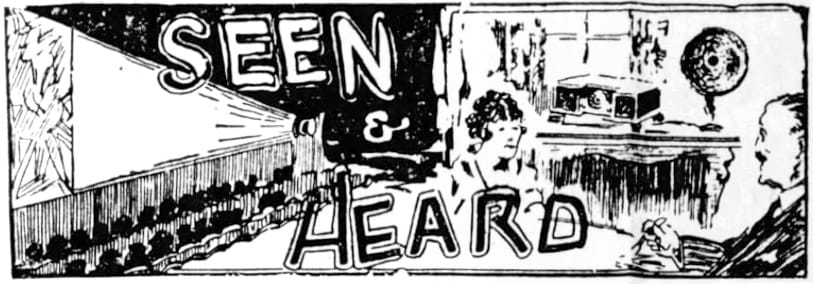
'Gwastad Bridge, Malpas Road Improvements'
Improvements to Gwastad Bridge on Malpas Road have been completed. A sum of £1,100 has been expended in widening the old structure and providing a retaining wall 53 yards long at the bottom of the hill. The place was very inconvenient previously, but now the bridge is fully 44 feet wide, and is very neat looking as well.
— South Wales Argus, Saturday 6th October, 1900 (subscription required)

Even though the bridge has long gone, I'm wondering if the walls still standing are from the retaining wall mentioned in the article?


A Runaway Horse
Andrew Palmer was driving a horse and trap belonging to Mr Bland, confectioner, up the Marshes-road, when the horse bolted. The man jumped out, and the animal careered down High-street, coming into contact with, and damaging, a cart belonging to Mr John Williams, Llandevaud, near Llanmartin. The runaway continued its course along Commercial-street, and eventually turned up the yard by the side of Mr Bland’s shop. In doing so the animal fell, breaking the two shafts of the cart.
— South Wales Argus, Thursday 14th February, 1895 (subscription required)
[The Mr Bland mentioned above is the same selling the ‘nicest Mince Pies’ advertised below]
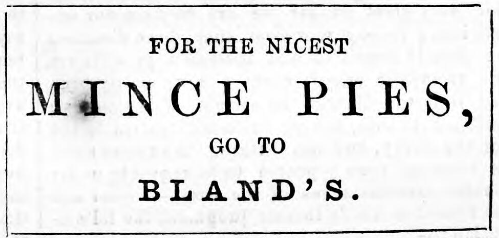

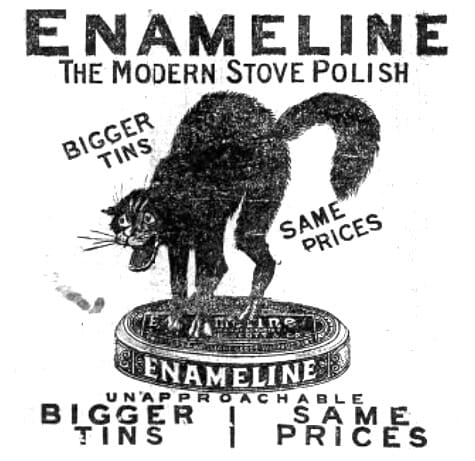
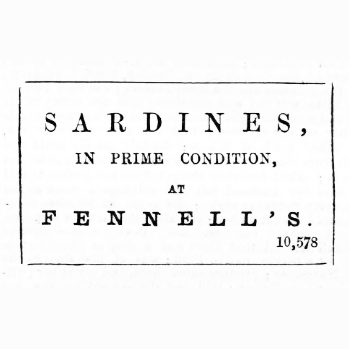
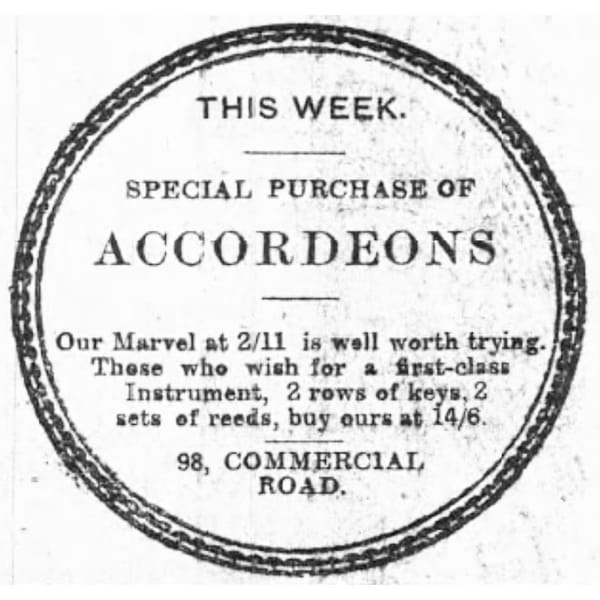
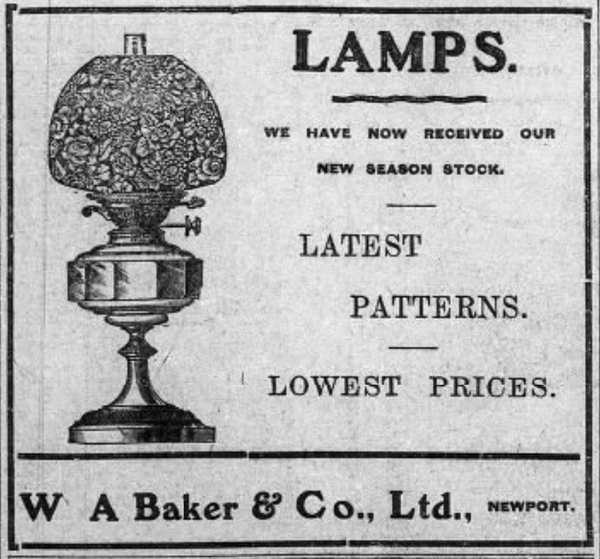

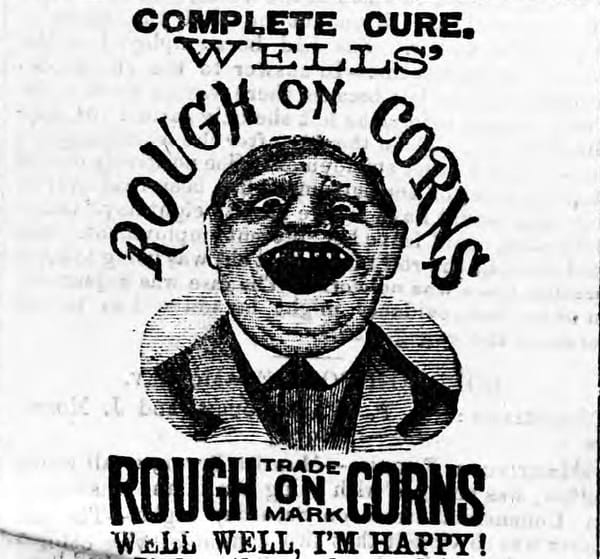
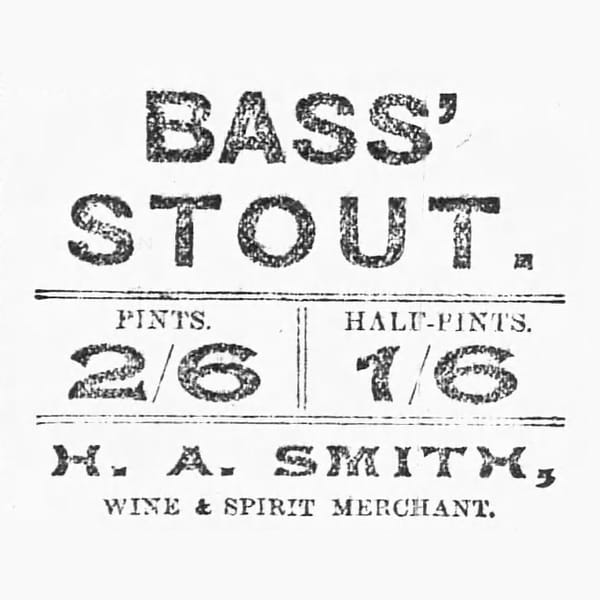
Member discussion